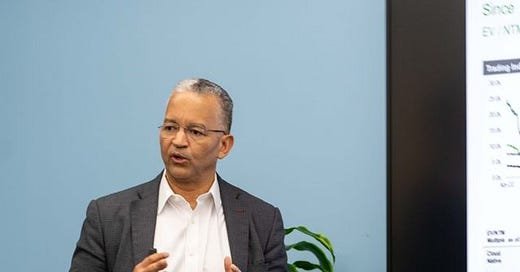Richard Vieira, Managing Director, Co-Head Technology Banking at TD Cowen, and graduate and Executive Fellow at the Harvard Business School, provided an insightful presentation analyzing the U.S. Mergers & Acquisitions (M&A) and Initial Public Offerings (IPO) markets, during the Swiss delegation visit last week.
Richard highlighted a 3.5% increase in the Consumer Price Index for February 2024 and discussed mixed corporate earnings for Q4. He pointed out the direct impact of geopolitical tensions and the U.S. elections on the broader market performance.
Viera spent considerable time on the cybersecurity sector, noting a valuation rebound and significant performance improvements in cloud-native and diversified security companies that are becoming critical to the safety and integrity of data and information. As part of his analysis he discussed a noticeable shift from a growth-at-any-cost mentality to a more practical focus on the need for profitability even though consistent growth still attracts investment.
To this point, Viera highlighted the significant AI advancements by tech giants such as Alphabet, Apple, Amazon, Meta, Microsoft, Nvidia, and Tesla which have helped these companies outperform the market.
He also addressed the wondrous topic of IPOs, which has seen a notable increase in 2024, with 20 IPOs raising $8.8 billion, a 277% increase from the previous year, reflecting strong investor interest in the healthcare, technology, and consumer sectors.
Lastly, Richard's analysis of the M&A market showed a stabilization in 2023 and an uptick in 2024, with strategic buyers edging out private equity in terms of deal value. This highlights a shift towards greater dominance by strategic buyers in the security sector and suggests a potential advantage for startups and emerging companies looking to align with strategic buyers in 2024.
What I took away of from this presentation:
For startups, the clarity of exit strategies remains as uncertain and unpredictable as the broader investment environment. The connection between the ease of obtaining funding and the availability of exit options is apparent. The tech and finance sectors are particularly attuned to the influx of AI-centric startups and the transformation of existing companies into AI-focused entities.
The big question on everyone's mind is how these dynamics will unfold in terms of exit strategies both this year and into 2025? A critical point from Richard's presentation is the increasing relevance of strategic exits and the significant decrease in private equity (PE) exits, which adds to the uncertainty and concern surrounding exit opportunities. As 2024 unfolds, the lack of clarity regarding exit opportunities has led VCs to become increasingly cautious in their investment approach – though mega-funding rounds are clearly the exception. This shift is putting additional pressure on startups, tightening the funding landscape even further.




